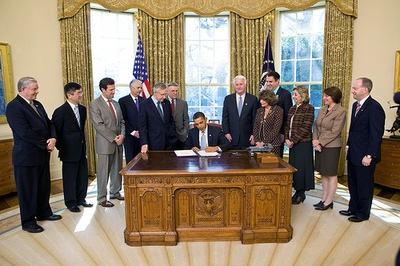Sunday, March 7, 2010 | 2 a.m.
Sun Coverage
Sun archives
- Obama signs tourism promotion bill into law (3-4-2010)
- Congress tries to attract foreign tourists to US (2-25-2010)
- Sen. Reid hopes travel bill passes by next week (2-24-2010)
- A do-over for Ensign, tourism bill (9-10-2009)
- John Ensign leads debate on tourism bill (9-8-2009)
Australia does it. Spain does it. Even Jamaica appears on our TVs at night, beckoning Americans to visit the sunny island with an enticing Bob Marley soundtrack.
Ever since the precipitous falloff of overseas visitors to the United States after the 9/11 attacks, the travel industry has been trying to get the federal government to help market tourist destinations, including Las Vegas, to visitors abroad.
Legislative efforts came and went, bills advanced and stalled.
President Barack Obama signed the Travel Promotion Act into law last week, capping a years-long journey for a bill that, despite widespread bipartisan support, faced hurdles until the end.
“All of us believe America is the best place to travel,” Obama said during an Oval Office bill-signing ceremony, flanked by lawmakers from Nevada and other tourism states. “Our ability to highlight the incredible bounty in this country, the sights and scenery, is something we should all be encouraging. That’s what this bill does.”
The legislative journey is a reminder of just how hard it can be to mix policy and politics into legislative success.
Years ago, Democratic Rep. Shelley Berkley and, later, former Republican Rep. Jon Porter took up the travel promotion cause. It was important to their Las Vegas-area districts.
Both worked hard to build support from colleagues on a subject that lobbyists say was unfamiliar to Washington. The town had little understanding of the economic benefits of travel and tourism.
The drop-off in foreign travel to the United States after Sept. 11, 2001, was steep. There were 2.4 million fewer overseas visitors in 2009 than in 2000, costing the country more than $500 billion in lost revenue, according to the Travel Industry Association.
Giving it clout, Senate Majority Leader Harry Reid also championed the issue as did Republicans Sen. John Ensign and Rep. Dean Heller and Democratic Rep. Dina Titus.
By 2007, a bill emerged that would create a public-private corporation to market the U.S. abroad with advertising, commercials and offices overseas. The entity would be launched with $10 million in seed money from the government, then every federal dollar would be required to be matched by money raised from industry. Annual government funding would come from a $10-per-visitor fee tacked onto visas.
Estimates are the bill would create 40,000 jobs in the first year, and generate $320 million annually in new tax revenue, contributing to long-term deficit reduction.
But President George W. Bush administration’s scoffed at the government spending. Republicans in the Senate blocked a vote. Porter even got upended by a firebrand member of his own party who called Las Vegas “decadent” at a committee hearing, leaving the Nevadan to object in offense.
Still, with a robust majority of 240 co-sponsors, the House bill passed unanimously in 2008. But it died there, blocked by Senate Republicans. With Obama in the White House in 2009, the travel industry pressed anew. In Las Vegas last month, Obama pushed the bill during a speech, handing the microphone to Reid, who explained its importance.
The bill had been slowly making its way through the House and the Senate — technical glitches required Reid to orchestrate do-over votes in both chambers this year — until it landed on Obama’s desk.
Despite widespread bipartisan support in both chambers, at least one Republican senator complained last week that the bill was nothing more than a gift to Nevada for Reid’s re-election campaign.
Almost a decade after the drop-off in visitors to the U.S., the government has intervened with a plan to bring them back.
“This is the way Washington works,” said Geoff Freeman, senior vice president of the Travel Industry Association. “Here in Washington, it’s lightning speed.”


Join the Discussion:
Check this out for a full explanation of our conversion to the LiveFyre commenting system and instructions on how to sign up for an account.
Full comments policy